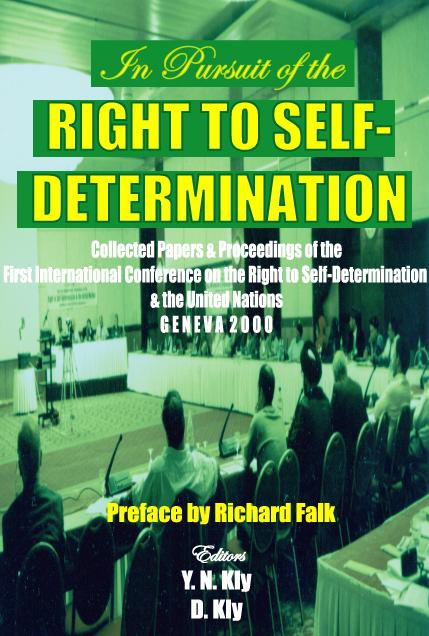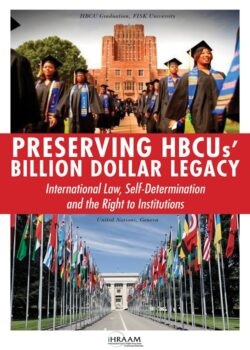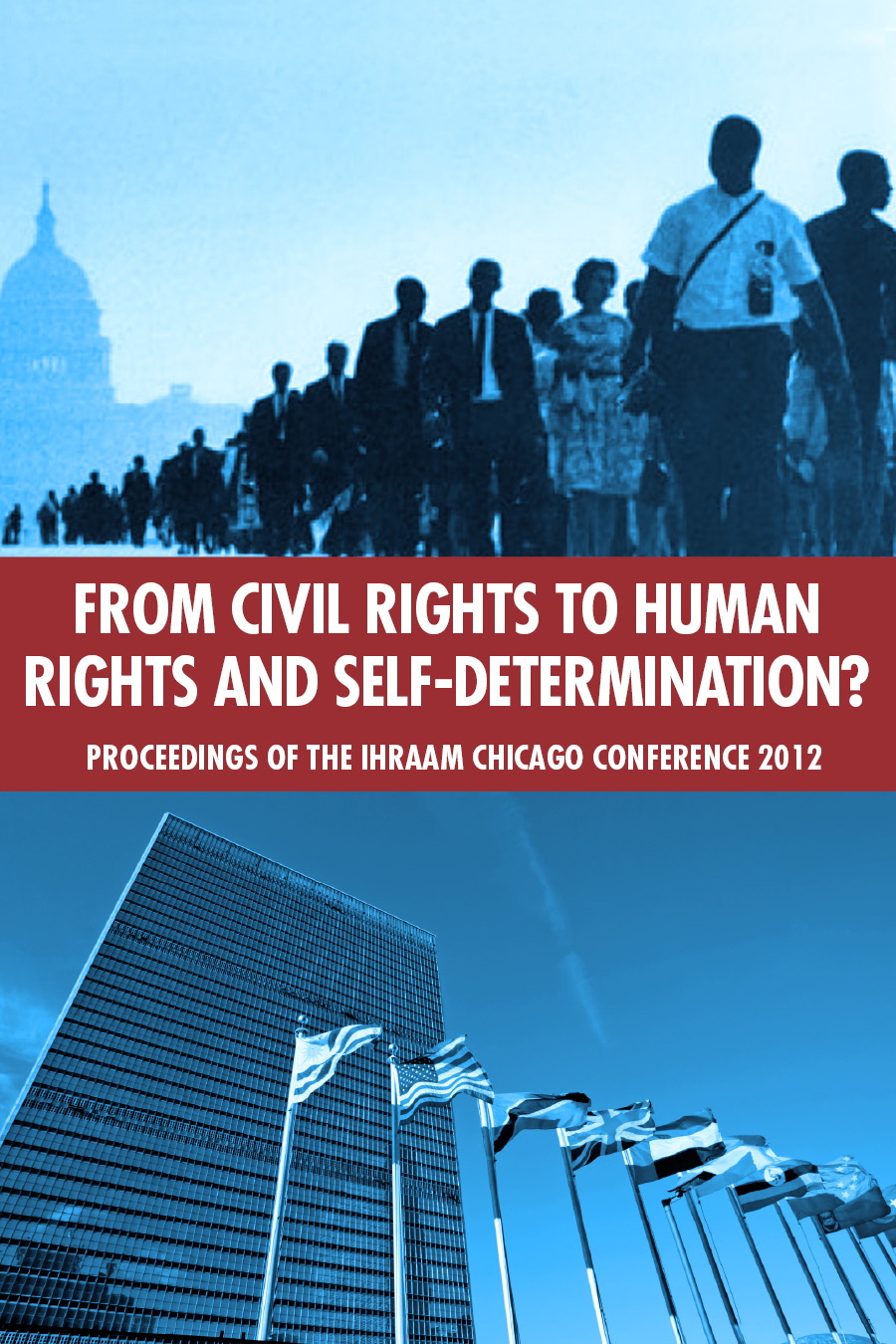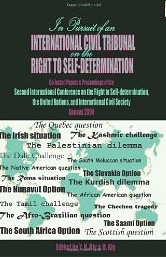HBCUs represent the historic United States institutionalization of African American higher education. They have played and continue to play a significant role in the training of African American professional sectors and in the economic viability of African American communities where they are situated. While during the Civil Rights period, the United States did remove de jure segregation and replace it with equality before the law, it nonetheless continued to recognize and fund HBCUs as an African American entitlement, in keeping with the desires of the African American people and their organizations. This is also in keeping with African Americans’ international minority right to institutions. However, recent US government policies undertaken without consultation with African American / HBCU leadership have disproportionately impacted the survival of these institutions. Supreme Court decisions have also played a negative role. PRESERVING HBCU’S BILLION DOLLAR LEGACY represents IHRAAM efforts from 2014-2015 to contextualize the struggle to save HBCUs within the context of the international minority right to institutions, and to stimulate debate and discussion within the HBCU and African American community as well as within government and the international community as to the value and applicability of international norms when seeking to resolve the ongoing disproportionately negative standing of African Americans in social indicators measuring well being—despite their having achieved de jure civil rights for nearly half a century. This book includes the above-mentioned primary documents projected by IHRAAM, as well as capturing the thinking of persons outside of IHRAAM, all of whom seek to save and empower HBCUs, and represent their own positions.

Publications
On April 20-21, 2012, the IHRAAM-sponsored Conference FROM CIVIL RIGHTS TO HUMAN RIGHTS AND SELF-DETERMINATION? sought to catalyze a turning point in the African American struggle. The Civil Rights movement that Martin Luther King assumed, five decades ago, would be “not long” in bringing “freedom” is now history. Affirmative action has shot its bolt. While its achievements are evident—Black faces appear in mainstream politics, academia, corporations and the media—the African American people at large face ongoing discrimination, mass incarceration and unemployment, prohibitive voting laws, growing destitution and legalized vigilante terrorism. The IHRAAM Conference provided a major mechanism to engage leading African American political thinkers in examining the potential that international human rights law and norms, and best state practices on internal self-determination might hold for African American collective development within the United States in the future. Key representatives from the African American popular leadership and intelligentsia flew into Chicago from all corners – California, Georgia, Illinois, Mississippi, New York, South Carolina, Washington, and Virginia—to assess, in this context, where the African American struggle had been, where it was now, and the direction it had to go to move forward. Speakers focused on the key issues of the recognition, maintenance and protection of African Americans’ collective identity, their need for collective social and economic development, and the significance of a territorial homeland. Most importantly, they agreed on the need for a democratically empowered political body such as a Consultative Assembly to specifically represent and act on behalf of the unique needs of African Americans. As a historically oppressed people, African Americans have the right to self-determination.
A breathtaking policy of criminalization, assimilation and extinguishment has been vigorously carried out against Indigenous Peoples where now there is a Canadian province called British Columbia. Present day governments have re-named those programs many times and continue to manufacture support for them within Indigenous communities, relying on the element of duress to force change. They are, to quote the 1948 Genocide Convention, “deliberately inflicting on the group conditions of life calculated to bring about its physical destruction in whole or in part.” They have not yet succeeded.
Why do the people of BC seek the dissolution of some thirty distinct Indigenous nations? Why do they cry,“ One law for all Canadians” in answer to Indigenous efforts to exercise their right of self-determination? Eighty percent of BC’s economy today comes directly from extractive industries using natural resources in lands and waters that have never been ceded, sold or surrendered to them by the owners.
The ongoing displacement and dispossession of Indigenous Peoples relies on the settler population’s indifference to their human rights. The interests of resource industries have dominated accounts of Indigenous Peoples throughout the mainstream media, the academic presses and the courts, impoverishing their histories and disappearing their futures. The indigenous have suffered excruciating losses. But the highest expression of government reconciliation has this bottom line and none other: release title to the traditional territories and resources; accept a small financial, land and program funding settlement; and become a BC municipality. The Colonial Present: The Rule of Ignorance & the Role of Law documents the colonizer’s manufacture of a new mythology to rationalize this ultimatum. This book is an unprecedented history and chronicle of British Columbians’ continuing attempts to leave the question of Indigenous Peoples’ rights in the past, without ever recognizing them in the present.
In the wake of September 11th, the trend among states has been to move away from recognition of the right of peoples to self-determination as enshrined in the International Bill of Rights, and increasingly to view individuals and groups seeking that right within the new context of the “war on terrorism”. This second international conference on the right to self-determination sought to respond to deepening UN acquiescence to the erosion of this basic right, by seeking to re-enforce its earlier understandings related to right to self-determination, and the institutional options for conflict resolution and management between groups within states.IN PURSUIT OF AN INTERNATIONAL TRIBUNAL ON THE RIGHT TO SELF-DETERMINATION addresses the question of whether the establishment of an International Civil Tribunal on the Right to Self-determination might be the most effective tool whereby international civil society might facilitate UN instruments and mechanisms as it concerns the right to self-determination.

“More than any recent occasion, the First International Conference on the Right to Self-determination the United Nations, held in Geneva during the millennial year 2000, dramatized the range of claims and the severity of suffering associated with their denial under a variety of statist and geopolitical pretexts… a truly historical contribution.” From the Preface by RICHARD FALK
In today’s world, there are over two thousand ethnic groups, but only 192 sovereign states. When dominant ethnic groups ignore the socio-economic and cultural identity needs and rights of other peoples within the same state, demands for self-determination arise. Wars that threaten the stability of whole regions often result. IN PURSUIT OF THE RIGHT TO SELF-DETERMINATION explores the issues within the context of just demands for self-determination. UN experts, minority members of various parliaments, distinguished scholars and representatives of nationalities deeply concerned with the right to self-determination examine the institutional options for pursuing cultural and socio-economic equal status between internal ethnic groups with a view to preventive management and conflict resolution. Its concluding resolution calls for the UN establishment of an Office of the High Commissioner for Self-Determination and a Self-Determination Commission comprised of UN member states.





